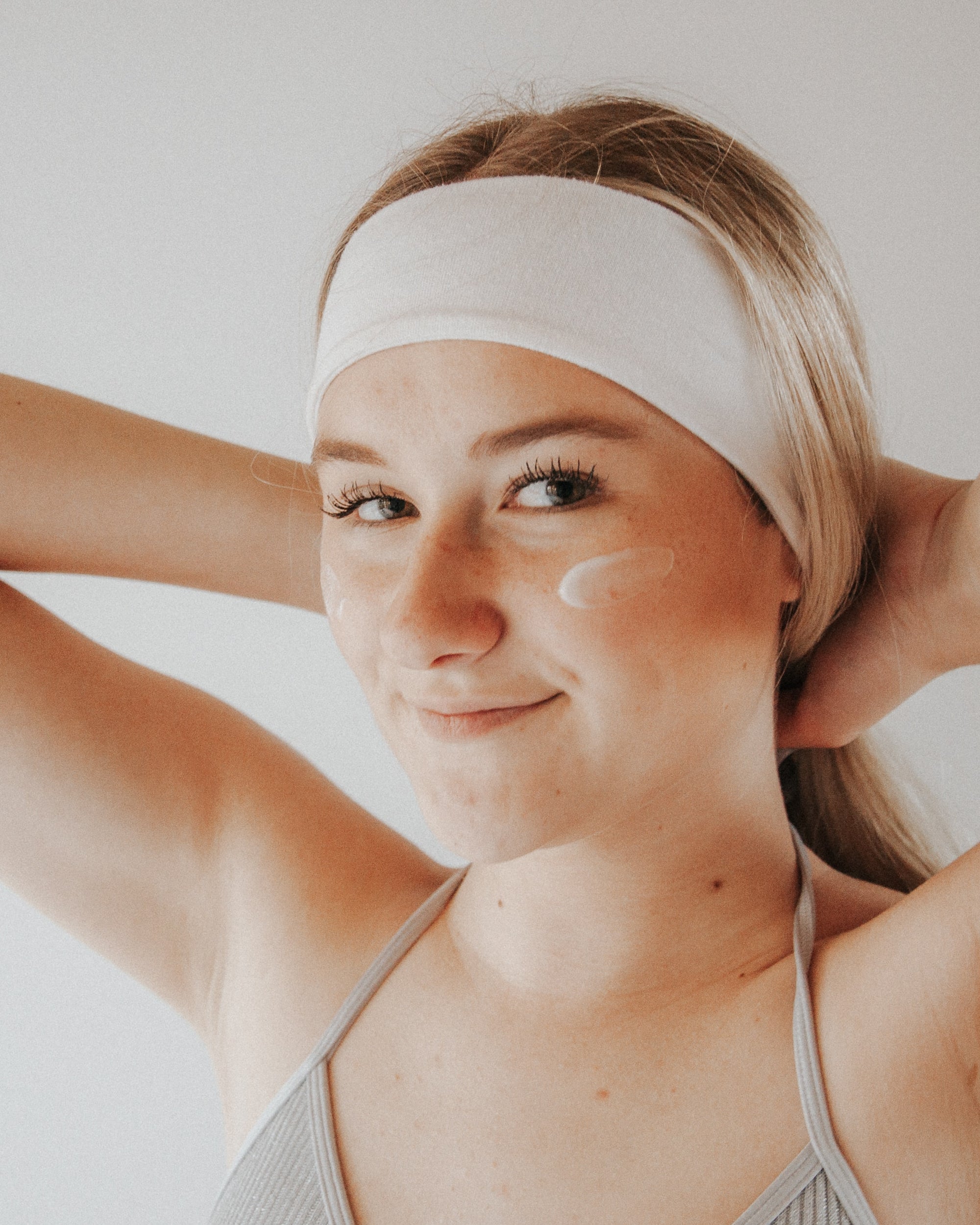

· By Keryce Henry
How to Create a Skincare Routine, From the Inside Out
Seeing people’s multi-step skincare routines can be intimidating. How many products do you need? What even is a serum? We’re here to ease some of those worries with this guide to creating a skincare routine.
Of course, this wouldn’t be a #BellwayFiberFacts posts if the gut wasn’t involved. Since gut function directly affects the appearance of your skin, this guide to creating a skincare routine also includes tips for what to eat to get your ✨glow✨ on. What can we say? We like to be thorough.
What products should you incorporate into your skincare routine?
Cleanser.
The first step of your skincare routine is to cleanse. Can’t have clear skin if it isn’t clean, right? You should be using a cleanser both morning and night, in order to clear sweat from your pores that may have accumulated there while you slept, and to wash the day off your face.
If you’re wearing makeup, consider a second cleanse to really ensure that your skin is clean. Just be sure not to use a cleanser that has sulfates, which can dry the skin.
Exfoliant.
Exfoliating helps with sloughing away dead skin cells, improving texture, and unclogging pores. Depending on your skin, you may want to use physical exfoliants (a scrub or face brush) or chemical exfoliants (e.g. products with glycolic or salicylic acid).
Masks.
It’s the most relaxing part of a skincare routine, working its magic while you kick your feet up. Clay masks draw impurities from your skin, while cream and sheet masks contain ingredients that focus on a specific benefit for your skin.
When using sheet masks, be sure to use every last drop of product in the packaging!
Toner.
Toners can help exfoliate dead skin cells and prep the skin so your products can really get in deep. The best ones also hydrate the skin, since cleansing can strip some moisture from your skin.
Serums.
These are skincare products made with highly concentrated ingredients packed into small molecules that penetrate your skin. Different serums target different problems, such as dryness or wrinkles. Nighttime serums are specially formulated to work while you sleep, so be sure to apply those before bed.
They do tend to be on the more expensive side, but a little goes a long way since they’re so concentrated.
Eye cream.
You have to take extra care with the skin around your eyes, since it’s more delicate than the rest of your face. Eye creams are specially formulated for keeping this area hydrated, minimizing fine lines and wrinkles, and deflating puffy eyes.
Moisturizer.
Moisturizing your skin keeps your skin balanced, so it doesn’t get too dry or oily. It also maintains the health of the skin cells on your face.
SPF.
Over time, sun rays can damage your skin, whether or not you’re on a beach vacation. For this reason, some moisturizers have SPF in order to protect the skin. If you’re using two separate products, just make sure you use moisturizer before SPF.
Lip balm.
Don’t forget your lips! Balm prevents dryness, flaking, and other damage to your lips.
What you eat has a direct effect on the appearance of your skin.
Why should your skincare routine involve your diet?
You might know this from experience, but what you eat has a direct effect on the appearance of your skin. Your gut is responsible for helping to absorb nutrients from the food we eat—like the proteins that keep your skin healthy—and eliminate toxins that can lead to inflammation, breakouts, and duller complexions.
What nutrients should you incorporate in your diet to help with your skincare routine?
Collagen.
Collagen is a protein produced by your body that works like scaffolding for our skin, giving it its shape and elasticity. The reason you start to lose elasticity in your skin from your mid-twenties is because you naturally produce less collagen from that age.
You can help compensate for this with a diet that includes foods high in collagen, such as bone broth, garlic, red and yellow vegetables, and white tea. It’s also popular to take daily supplements to increase collagen intake as well.
Fiber.
One of the most effective ways to support your skin health via the gut is with fiber. Fiber nourishes the gut and keeps things moving efficiently, so it does an even better job of absorbing the good stuff and getting rid of the bad.
You can increase your fiber intake with fruits, vegetables, legumes, and grains. Pro tip: Swap your usual foods for high-fiber options, e.g. brown rice for white rice and whole-wheat bread for white bread. Daily fiber supplements can also come in handy for this. Consider Bellway Beauty Super Fiber + Collagen, which harnesses the dual action of fiber and collagen to boost skin health. Even more, it contains no artificial ingredients that can hamper its effectiveness, along with real fruit (so it actually tastes good!).
Omega-3 fatty acids.
Omega-3 fatty acids are essential for supple, moisturized skin and controlling redness and acne. They can be found in salmon and other fatty fish, including mackerel and herring.
Healthy fats.
Avocado is our favorite for this one. Healthy fats are great for keeping your skin moisturized and flexible. The latter is especially important as you get older, since your skin naturally begins to lose elasticity from around age 25. Which brings us to...
Vitamins E and C.
Vitamin E is great for skin because of its anti-aging, antioxidant, and anti-inflammatory properties, but studies show that it can work even more effectively when you’re getting vitamin C in your diet as well.
You can find vitamin E in plant-based oils, nuts, seeds, fruits, and vegetables (think: almond butter, sunflower oil, and pumpkin). Vitamin C can be found in citrus fruits, peppers, broccoli, Brussels sprouts, and potatoes.



